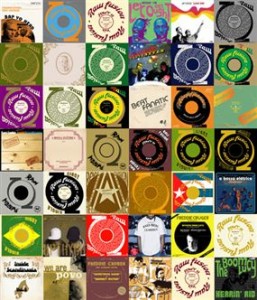Article
XLR8R
January, 2007
Link

Neither Arctic chill nor a buttoned-down reputation has kept a healthy homegrown hip-hop scene from taking root in Stockholm. The capital city teems with record stores, where you can pick up the latest from local labels like JuJu Records, DvsG (David vs. Goliath), and Raw Fusion, which has successfully exported beat-makers like Up Hygh and Freddie Cruger to the US. Numerous American acts have performed here, especially at now-defunct clubs like Fatmilk and the Jump-Off. You can even check out the “hip-hop school” in the suburb of Farsa, where students learn breakdancing and beat-making.
Sweden’s first hip-hop records were reputedly released in the mid-’80s, adapting American style and slang and setting a template for the genre’s development. Artists rapped predominantly in English until the early ’90s–spurred on by a long-running hip-hop video program called 1200–until The Latin Kings (TLK), a group of Venezuelan and Chilean immigrants from the Stockholm suburb of Botkyrka, started spitting in Swedish, recording their hit album, Välkommen Till Förorten (Welcome to the Suburbs), in a slang dialect known as Rinkeby (named after the highly African-populated suburb of the same name). Stockholm hip-hop names like ADL and Petter followed suit; the latter’s 1999 album, Mitt Sjätte Sinne (My Sixth Sense), helping to usher in a huge expansion in the country’s hip-hop community. Now, rappers like Ison & Fille and Promoe and producers like Drumz, DJ Large, Embee, Breakmechanix, and Soul Supreme are redefining Swedish hip-hop.
Besides Stockholm, the cities of Gothenburg and Malmö both have sizable scenes, but despite differences in dialect, each region doesn’t have a signature sound. “There aren’t huge divides in styles,” says Aaron Phiri of the duo Hearin’ Aid, which puts out soulful beats with a dirty J Dilla edge to them. “You get your Swedish East Coast right next to your Swedish Dirty South right next to your Swedish Detroit!”
Hip-hop encourages a blunt form of proletariat journalism, and Swedish rap is no exception. Timbuktu–whose reggae-tinged Alla Vill Till Himmelen (Everybody Wants to Go to Heaven) was a huge hit in ’05–explains that social changes over the last 20 years have given kids plenty of material. As the right-wing government increasingly deconstructs educational and welfare systems, and immigrants continue to arrive from Middle East, Somalia, and Eastern Europe, previously unknown race and class issues have come to the forefront of Swedish culture.
“You can see lots of social tension and class differences,” says Timbuktu. “It’s a microcosm of the U.S. and England. You can see how poor people end up in high-rise buildings, called förort, outside of the city core.”
Despite language and cultural barriers, hip-hop’s promise of giving a voice to the disenfranchised still translates in Sweden. And hell, Swedes love to tugga (“chill”), kicka (“smoke”), and gendish (“get drunk”) as much as anybody else.